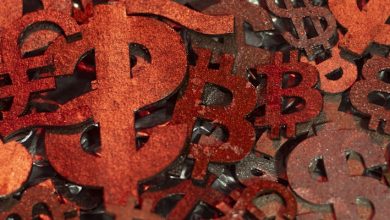The Rise of DeFi: How It’s Changing the Market Landscape

- Understanding the basics of DeFi
- Exploring the impact of DeFi on traditional finance
- The role of smart contracts in DeFi
- Challenges and opportunities in the DeFi space
- Regulatory concerns surrounding DeFi
- The future of DeFi and its potential implications
Understanding the basics of DeFi
DeFi, short for decentralized finance, is a revolutionary concept that aims to transform traditional financial systems by leveraging blockchain technology. In simple terms, DeFi refers to the use of decentralized networks and smart contracts to provide financial services without the need for intermediaries such as banks or financial institutions.
One of the key principles of DeFi is the concept of open access, which means that anyone with an internet connection can participate in the DeFi ecosystem. This democratization of finance allows individuals from all over the world to access financial services that were previously only available to a select few.
Another important aspect of DeFi is the emphasis on transparency and security. Since transactions on the blockchain are immutable and transparent, users can have confidence that their funds are secure and that there is no risk of fraud or manipulation. This level of trust is crucial for the success of DeFi platforms and has led to a surge in popularity among users seeking alternatives to traditional financial services.
Overall, understanding the basics of DeFi is essential for anyone looking to participate in this rapidly growing market. By familiarizing yourself with the key concepts and principles of DeFi, you can take advantage of the numerous opportunities that decentralized finance has to offer. Whether you are interested in lending, borrowing, trading, or investing, DeFi provides a new and exciting way to engage with the world of finance.
Exploring the impact of DeFi on traditional finance
The impact of decentralized finance (DeFi) on traditional financial systems has been a topic of much discussion in recent years. DeFi has the potential to revolutionize the way we think about and interact with money, offering new opportunities for financial inclusion and innovation.
One of the key ways in which DeFi is changing the market landscape is by providing an alternative to traditional banking systems. With DeFi, individuals can access financial services such as lending, borrowing, and trading without the need for a centralized intermediary. This not only reduces costs but also increases accessibility for those who may not have access to traditional banking services.
Furthermore, DeFi is also challenging the way we think about asset ownership and control. In traditional finance, assets are typically held and controlled by third parties such as banks or brokerage firms. With DeFi, individuals can maintain control of their assets through the use of smart contracts and blockchain technology, reducing the risk of fraud or mismanagement.
Overall, the impact of DeFi on traditional finance is still being realized, but it is clear that it has the potential to disrupt the status quo and usher in a new era of financial innovation and inclusion. As the DeFi ecosystem continues to evolve, it will be interesting to see how traditional financial institutions adapt to this new paradigm shift.
The role of smart contracts in DeFi
Smart contracts play a crucial role in the decentralized finance (DeFi) ecosystem. These self-executing contracts are written in code and automatically enforce the terms of an agreement when predefined conditions are met. In DeFi, smart contracts eliminate the need for intermediaries, such as banks or lawyers, by enabling trustless transactions between parties. This not only reduces costs but also enhances security and transparency in the financial system.
One of the key advantages of smart contracts in DeFi is their ability to automate complex financial processes. By programming the rules directly into the contract, users can execute a wide range of financial transactions, including lending, borrowing, trading, and more, without relying on centralized authorities. This not only streamlines the process but also minimizes the risk of human error or manipulation.
Moreover, smart contracts in DeFi are highly customizable, allowing users to create their own financial products and services tailored to their specific needs. This level of flexibility and innovation has led to the rapid growth of the DeFi market, attracting a diverse range of participants from individual investors to institutional players. As a result, DeFi has emerged as a disruptive force in the traditional financial sector, challenging the status quo and revolutionizing the way we think about finance.
Overall, smart contracts are the backbone of DeFi, enabling the seamless and secure execution of financial transactions on a global scale. As the DeFi ecosystem continues to evolve and mature, smart contracts will play an increasingly important role in shaping the future of finance. By embracing this technology, individuals and institutions alike can take advantage of the numerous benefits offered by DeFi, including greater financial inclusion, efficiency, and autonomy.
Challenges and opportunities in the DeFi space
One of the challenges facing the decentralized finance (DeFi) space is the issue of security. With the increasing popularity of DeFi platforms, hackers are always on the lookout for vulnerabilities to exploit. This poses a significant risk to both users and the overall credibility of the DeFi ecosystem. However, this challenge also presents an opportunity for developers to innovate and create more secure protocols and smart contracts to protect users’ funds.
Another challenge in the DeFi space is the lack of regulation. While this is one of the key features of DeFi – decentralization – it also means that there is a higher risk of scams and fraudulent activities. Without proper regulation, users are left vulnerable to malicious actors who may take advantage of the unregulated environment. On the flip side, this lack of regulation also allows for more freedom and flexibility in the DeFi space, enabling innovation and experimentation with new financial products and services.
Scalability is yet another challenge that the DeFi space faces. As more users flock to DeFi platforms, the current infrastructure may struggle to handle the increasing demand. This can lead to network congestion and higher transaction fees, making DeFi less accessible to the average user. However, this challenge also presents an opportunity for developers to work on scaling solutions such as layer 2 solutions and interoperability between different blockchains.
In conclusion, while the DeFi space is not without its challenges, it also offers a plethora of opportunities for growth and innovation. By addressing issues such as security, regulation, and scalability, developers can help build a more robust and sustainable DeFi ecosystem that benefits users and the broader financial market.
Regulatory concerns surrounding DeFi
Regulatory concerns surrounding decentralized finance (DeFi) have been a hot topic in the financial world. As this innovative technology continues to disrupt traditional financial systems, regulators are struggling to keep up with the rapid pace of change.
One of the major concerns is the lack of oversight and regulation in the DeFi space. Unlike traditional financial institutions, DeFi platforms operate without the need for intermediaries or central authorities, making it difficult for regulators to monitor and enforce compliance with existing laws.
Another issue is the potential for DeFi platforms to be used for illegal activities such as money laundering and terrorist financing. The anonymous and decentralized nature of these platforms makes it easy for bad actors to exploit them for their own gain, posing a significant risk to the financial system.
Regulators are also concerned about the lack of consumer protection in the DeFi space. Unlike traditional banks, which are required to adhere to strict regulations to protect consumers, DeFi platforms offer little to no recourse for users who fall victim to fraud or other malicious activities.
Overall, while DeFi has the potential to revolutionize the financial industry and increase financial inclusion, it also presents significant challenges for regulators. Finding the right balance between innovation and regulation will be crucial in ensuring the long-term success and sustainability of the DeFi ecosystem.
The future of DeFi and its potential implications
The future of decentralized finance (DeFi) is promising, with its potential implications reaching far and wide across the financial landscape. As DeFi continues to gain traction, it is poised to revolutionize traditional financial systems by providing greater accessibility, transparency, and efficiency. This shift towards decentralized platforms has the potential to democratize finance, allowing individuals from all walks of life to participate in a more inclusive financial ecosystem.
One of the key implications of the rise of DeFi is the disintermediation of traditional financial institutions. By cutting out the middleman, DeFi platforms can offer financial services directly to users, reducing costs and increasing efficiency. This has the potential to disrupt the traditional banking sector, as individuals and businesses turn to decentralized platforms for loans, savings, and investments.
Furthermore, the transparency and security offered by DeFi protocols have the potential to increase trust among users. Smart contracts, which are self-executing contracts with the terms of the agreement between buyer and seller directly written into lines of code, eliminate the need for intermediaries and provide a high level of security. This increased trust could attract more users to DeFi platforms, further driving adoption and growth in the space.
As DeFi continues to evolve and innovate, it is likely to expand its offerings beyond the current suite of financial products and services. New applications and use cases are constantly being developed, from decentralized exchanges to prediction markets to insurance platforms. This diversification of services could open up new opportunities for individuals and businesses to access innovative financial products that were previously unavailable in the traditional financial system.
In conclusion, the future of DeFi holds great promise, with its potential implications set to reshape the financial landscape as we know it. By providing greater accessibility, transparency, and security, decentralized finance has the power to democratize finance and revolutionize the way we interact with money. As DeFi continues to grow and innovate, it will be interesting to see how traditional financial institutions adapt to this new paradigm shift in the market.



